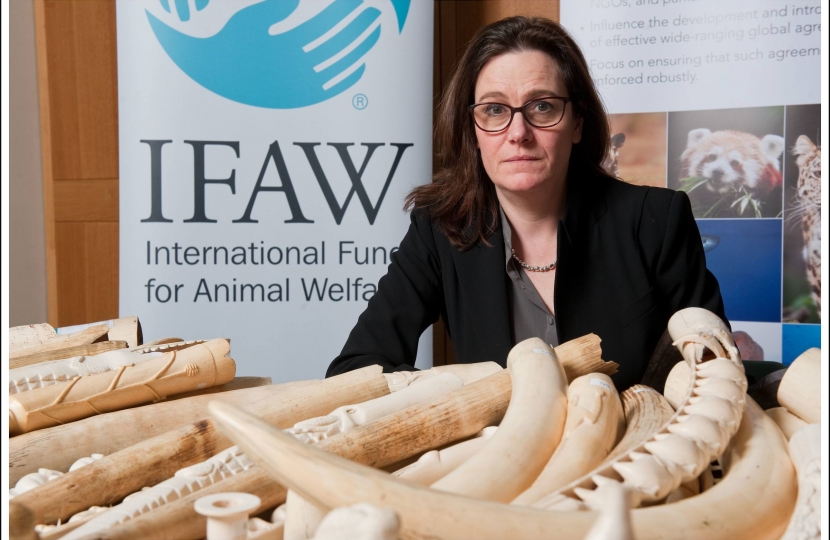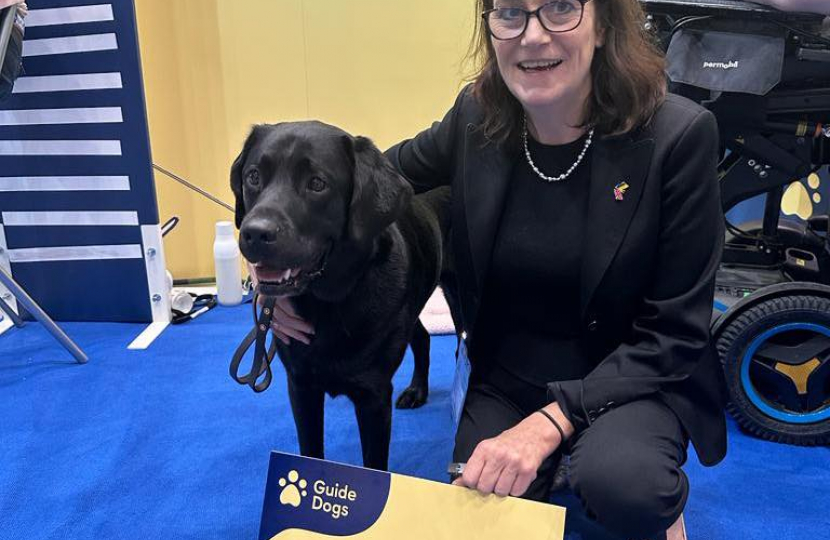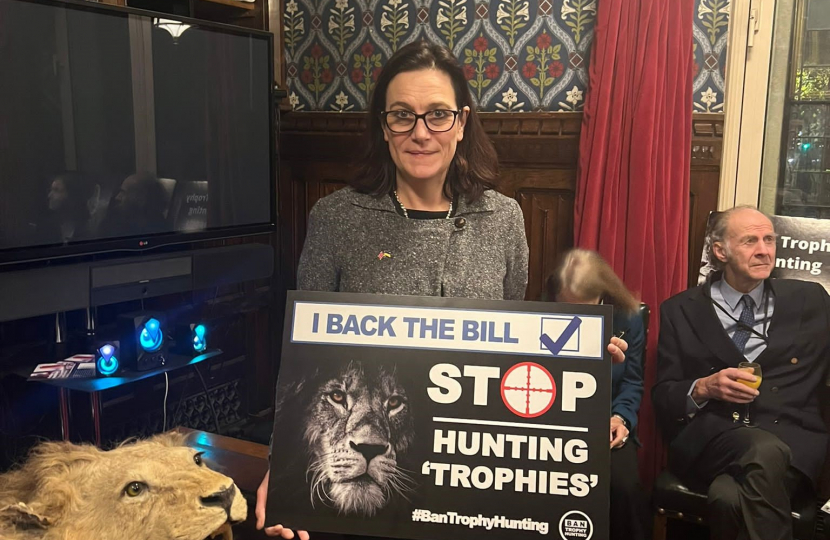ACTION PLAN FOR ANIMAL WELFARE
Now that we have left the EU, the UK has new freedoms to further strengthen animal welfare standards and reinforce its position as a global champion of animal rights. In a first of its kind, the Government published an Action Plan for Animal Welfare in May 2021 that is having a huge impact on the legislation that is being introduced to improve animal welfare.
FINN’S LAW PART 1 & 2
Police support animals make a valuable contribution in the detection and prevention of crime and in maintaining public safety. Attacks of any sort on police dogs or horses are unacceptable and should be dealt with severely under the criminal law. Rebecca has spent time with the Essex Police Dog Unit where she met several police dogs and their handlers.
Under the Animal Welfare Act 2006 an attack on a police dog or other police support animal can be treated as causing unnecessary suffering to an animal, and the maximum penalty has now been increased through the Government's actions to 6 months imprisonment, an unlimited fine, or both. Indeed the financial element of the penalty was raised in 2015 from a maximum fine of £20,000. Similarly an attack on a police animal could be considered by the court as an aggravating factor leading to a higher sentence. Under some circumstances assaults on support animals could be treated as criminal damage which would allow for penalties of up to 10 years' imprisonment.
Sentencing guidelines were updated in January 2017 and now include a new aggravating factor of causing unnecessary suffering to an animal being used in public service or as an assistance dog under section 4 of the Animal Welfare Act 2006. The Government supported Finns Law, a Bill that makes it a specific offence to attack police or prison officer dogs and polices horses. It also removes a current provision for someone to claim self-defence if they have harmed a service animal.
Animal abusers who commit the most despicable crimes will now face up to 5 years in prison following the Government's Animal Welfare (Sentencing) Act or Finn's Law Part 2. The previous maximum sentence for cruelty was six months but after several shocking cases the Government did the right thing and brought forward proposals to raise this significantly. The increased sentence sends a clear signal to any potential offenders that there is no place for animal cruelty in England.
MICROCHIPS
Microchipping for dogs became compulsory for animals over eight weeks of age across England, Scotland and Wales in 2016. One year after the Government introduced this policy, the Dogs Trust reported a reduction of 18 per cent in the total stray dog population. In 2016, UK local authorities collected 81,000 strays, while in 2020 this fell to 50,000.
The Government is also delivering on the manifesto commitment to introduce compulsory microchipping of cats. In December 2021, the Government announced plans that will mandate all keepers to ensure their pet is microchipped before they reach the age of 20 weeks and their contact details stored and kept up to date in a pet microchipping database. Owners found not to have microchipped their cat will have 21 days to have one implanted, or may face a fine of up to £500. All owners must have their cat microchipped by 10 June 2024 and owners found not to have microchipped their cat will have 21 days to have one implanted.
The Government is also legislating to make it an offence for a person who is responsible for a cat or dog to attach an electronic collar to these animals in England.
CCTV IN SLAUGHTER HOUSES
The new legislation came into force in 2018, delivering on the Government’s manifesto commitment for cameras in every abattoir in England in all areas where live animals are present. All slaughterhouses have been required to comply in full since 5th November 2018.
LUCY’S LAW
The Department for Environment, Food and Rural Affairs completed an extensive consultation on an outright ban following a commitment by the Prime Minister in December 2017 to crack down on cruel puppy farms and their conditions. Following this, the Government introduced legislation to tackle the low-welfare, high volume supply of puppies and kittens, by banning their commercial third-party sale in England.
‘Lucy’s Law’ means that anyone wanting to get a new puppy or kitten in England must now buy direct from a breeder, or consider adopting from a rescue centre instead. Licensed dog breeders are required to show puppies interacting with their mothers in their place of birth. If a business sells puppies or kittens without a licence, they could receive an unlimited fine or be sent to prison for up to six months.
IVORY BAN
The Ivory Act came into force in full in June 2022. It means the sale of ivory of any age is banned, with narrowly defined and carefully-targeted exemptions for items which do not contribute to the poaching of elements. Through covering ivory items of all ages, the UK’s ban will be one of the toughest in the world. Anyone caught breaking the ban will face up to five years in jail or a maximum £250,000 fine.
The UK is showing global leadership in the international fight against the illegal ivory trade and building on their work both at home and overseas. In May 2023, it was announced the Act was being extended to hippopotamus, walrus, narwhal, killer whale and sperm whales so they can receive greater legal protections under the UK’s world-leading ban.
TACKLING INTERNATIONAL POACHING
In 2020, as part of the Government’s determination for the UK to play a leading role in tackling animal cruelty and counter-international poaching efforts, troops from the Royal Gurkha Rifles spent 6 weeks helping train Zambian rangers on counter-poaching, helping to strengthen Zambia’s response to the illicit wildlife trade, estimated to be worth up to £17 billion a year internationally to criminal gangs.
ANIMAL WELFARE (SENTIENCE) ACT
In 2022, the Government introduced the Animal Welfare (Sentience) Act. This Act means animals are now recognised as sentient being in UK law. This Act also creates an Animal Sentience Committee has been devised to ensure cross departmental government policy considers the impact of any new policy on animal welfare.
PRIVATE MEMBERS’ LEGISLATION
As the Private Members’ Bills Whip Rebecca has helped several MPs guide their legislation into law. In recent years this has included:
- Glue Traps (Offences) Act – From July 2024, bans the use of inhumane glue traps which are a widely available method of rodent control but can cause immense suffering.
- Animals (Low-Welfare Activities Abroad) Act – Bans the sale and advertising of activities aboard which involve low standard of welfare for animals.
- Shark Fins Act - Banning the import and export of detached shark fins, including all products containing shark fins.
- Animals (Penalty Notices) Act - Widens the penalties on people who fail to properly care for their pets, zoo animals and livestock of up to £5,000.
FURTHER MEASURES
Rebecca is also supporting several Bills which are before Parliament. These include:
- Animal Welfare (Import of Dogs, Cats and Ferrets) Bill which seeks to restrict the importation and non-commercial movements of dogs, cats, and ferrets.
- Animal Welfare (Livestock Exports) Bill which will ban the export of certain livestock from the UK for slaughter.
- Pet Abduction Bill where anyone found guilty of stealing a pet will face up to five years in prison, a fine, or both.
- Hunting Trophies (Import Prohibition) Bill which will ban the import of hunting trophies from species of conservation concern.
- Dogs (Protection of Livestock) (Amendment) Bill where the police will be given greater powers to respond to livestock worrying incidents more effectively.


